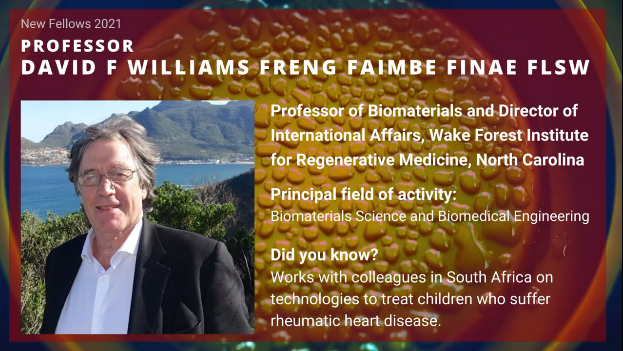
David Williams, FREng.
AIMBE College of Fellows Class of 2000
Society’s New Fellows Show Strength of Wales’ Academic and Intellectual Life
Via Learned Society of Wales | April 27, 2021The Learned Society of Wales has welcomed 45 new academics, researchers and professionals to its Fellowship. The new Fellows demonstrate the ongoing excellence of Welsh research, universities and intellectual life, all of which have shone during the extraordinary events of this pandemic-marked year.
The new Fellows include academics from Welsh, UK and overseas higher education institutions as well as individuals who a play a significant role in Welsh public life. Specialisms range from nanotechnology to jazz, parliamentary history to tumour biology and much in between… Continue reading.
First-in-Man Experience with Non-Occlusive Helical Balloon Catheter In the Delivery of TAVI Heart Valves
Via AIMBE | February 11, 2019At the end of January, 2019, a woman with severe aortic valve stenosis was successfully treated with a replacement valve in the world-famous Groote-Schuur Hospital, South Africa, using highly innovative delivery technology developed by Strait Access Technologies, a spin-out company of the University of Cape Town (UCT). The procedure was carried out by Dr. Jacques Scherman, Senior Specialist Cardiothoracic Surgeon in the Chris Barnard Division of Cardiothoracic Surgery, UCT; the location of this First-in-Man procedure was in the same building that Chris Barnard carried out the world’s first heart transplant just over 50 years ago.
The ultimate objective of this ground-breaking technology is the treatment of young adults who are suffering from and dying of rheumatic heart disease (RHD). The World Health Organization has recently recognized that RHD is a serious public health problem in many parts of the world, especially those of low- and middle-income countries. Over 30 million people are affected by RHD globally, which is responsible for 300 000 deaths annually and massive levels of disability among the young. The disease is of bacterial origin, and theoretically preventable, but efforts with the control of RHD have had minimal success in impoverished communities, especially those in sub-Sahara Africa and parts of China, India, Russia and South America. Interventional approaches to treat RHD, such as open-heart surgery, are largely inaccessible in these regions; the pathology of RHD is also very different to that of heart valve disease in older patients in the first-world, so much of present-day cardiac technologies are both unavailable and irrelevant… Read the full article.
 AIMBE
AIMBE

